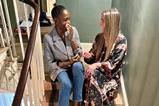Our editor Tola-Doll Fisher caught up with Sheila Akomiah-Conteh to discuss theological education, women’s roles in the Church and the growth of African Christianity in Britain
Tola-Doll Fisher (TDF): Sheila I have been reading some of your research on the impact of African churches in Britain but for our readers not familiar with your work, what exactly do you do?
Sheila Akomiah-Conteh (SAC): I’ve been a lecturer in African theology for a year and the main modules that I teach are African and black Christianity, African and black theology and also global Pentecostalism. This course was a new missional pathway, introduced by Church Mission Society in conjunction with an organisation I’m part of called Missio Africanus to equip the diaspora missionaries to do mission in Britain. The story of Christianity in Britain, not just England but the whole of Britain, has for a very long time been about decline and how the main traditional churches are losing their members and closing down.
I was interested in this area because my personal experience was different so I know that’s not the whole story. Because there’s another area of Christianity that is growing very rapidly, and it’s very vibrant: diaspora Christianity. Britain needs to pay some attention to the diaspora Christianity communities in terms of gaining knowledge about those groups and what they are doing; learning about that type and style of Christianity. There also a need to learn about training and educating the diaspora Christians to do mission in Britain, and also for British Christians who want to learn how to do mission in a multicultural context.
Wherever there are no women, growth is stunted
TDF: Media headlines confirm that the former archetype of Christian Britain might be slipping away. What do you think is the reason for that decline?
SAC: There are so many theories out there, but the most convincing for me has to do with the cultural changes that took place, especially in the 1960s, after the Second World War and they are to do with the empowerment of women.
When those cultural changes took place, and women became more active in society, in work, in family leadership, eventually there was this cultural revolution with women being freer and believing they can do what men can do etc. Because those changes had women at the forefront one of the key things that happened that affected Christianity was the slowing down of the passing on of faith to family.
Recently, I’ve done some focus group discussions for research on second-generation African Christians, asking how they experience their faith and how they are going to carry them on. When we asked the question: “How did you come to faith?”, almost every one of them mentioned that it started from family. They would say: “My family was very religious” or “My mum [or my grandma] took me to church.”
Family socialisation into religion is a key example of how religious practice and even culture is passed on. And that was lost, or disrupted, from the 1960s because during the cultural revolution, women didn’t feel like going to church so much anymore. Because of that, they didn’t socialise their children [into faith] or take their children to church. So there is, I would say, at least two generations of British people who have never been to church and who don’t have any background at all in church.
I was a secondary school teacher for about a year and this issue was really starkly presented to me. I was in a classroom with young people between the ages of 11 to 16/17 who had absolutely no foundation in Christianity. They knew that Jesus was born at Christmas, but they had absolutely no knowledge of those basic Bible stories that some of us grew up with. So now, missionaries to Britain have to start from zero, with the assumption that they are speaking to people who have no foundation at all.
Many Africans migrated to Britain, and they came with their faith
TDF: I think when most of us think about the swinging 60s, we see it as the liberation and freedom of women. But from what you say, it sounds like the knock-on effect of that was that the faith aspect of family life was not carried on because that was primarily a woman’s job?
SAC: Historically, and even now, faith and religion, especially in Christianity, has always been carried by a woman. Here in Britain, the greatest percentage of Christians will be women. In the African black church, or black majority churches, it’s the same story.
TDF: But why is that? Peter Kerridge our late CEO, Premier, has been quoted as saying that the UK Church would fold if it weren’t for women. Why is Christianity so female focused?
SAC: I’m not sure if I can answer that, but this is my own theological understanding of it. From the story of Genesis, I believe that women have a great role to play in God’s plan for his creation – which is why God said it was not good for man to be alone.
I believe if there weren’t as many women in the kingdom of God in the Church, things would be very, very different. Women are helpers and wherever there are no women, growth is stunted. When you look through the Old Testament, you will see how God used women in many key places. When we think about Moses, it is with him at the forefront as the man and the leader, but it took a woman’s ingenuity, wisdom and support to make sure that Moses became Moses.
We hear about Jesus’ twelve main apostles who were all male, but there were so many women who followed Jesus and supported his ministry with their resources. And at the end of Jesus’ life the men had left – it was the woman who were still following him.
I really hope that all women grasp more firmly the role we have to play in God’s kingdom and grow beyond conversations that we can’t be in leadership etc. Because when I consider biblical history and theology, I see how women have always been a key part of God’s plan.
TDF: In your work you quote a Swiss theologian called Hollenweger who said “Christians in Britain prayed for many years for revival, and when it came, they did not recognise it because it was black.” When did he write that and what did he mean by this statement?
SAC: This was from around the 1990s. The story of black Christianity in Britain is quite young. It started from the 1980s when there was open migration to the Commonwealth. The Caribbean influx to the UK was before; however, in terms of the current levels of black Christianity that we are seeing today, that started from the 1980s and many Africans migrated to Britain, and they came with their faith.
Much has been written about Caribbean and new Africans who came to the UK and didn’t feel welcomed into some of the white traditional existing churches; so much so that they ended up having to go and form their own groups. That is what has grown, and is now being seen as the movement that is revitalising British Christianity.
During my PhD research, I discovered that in a period of 16 years, 110 new churches were established in Glasgow and 73 per cent of these were African churches. Some people took it very positively and were interested in what was going on but I was giving a presentation to a group of key Christian leaders in Scotland, and during the Q&A afterwards, someone just very flippantly commented: “There are so many black African black churches, but you know, they are just attracting their own people. So that’s not mission.”
I was so taken aback, and it made me really sad. If you’re attracting black people, isn’t it still mission? I don’t know where that kind of thinking could come from. There is a lot of decolonising to do, because there is a certain picture of who a missionary is: white, travelling abroad to Asia or somewhere supported by mother Church. That picture has to be broken down.
Many black Africans see themselves as accidental missionaries, as going to church, preaching or telling someone about the gospel is natural to their flow of things of theology. The fact that so many black churches have just sprouted up and are successful; they were just being themselves.
My own church in Scotland was started in 2000 by a group of about five Ghanaian students. They started attracting other students and before they knew it, they were gathering 20 or 30. They ended up writing a letter to the church in Ghana, asking: “Could you send a minister because we are growing?!”
TDF: Going back to the importance of women in the Church, what can you share with Woman Alive readers?
SAC: Women are the least resourced in theology. When I consider something like even my own Pentecostal denomination, they don’t call women pastors, but they will call the men to be pastors and tell them: “We are calling you and your wife together.” But the man is sent to theological school to get all the training while the wife just sits at home and waits for the husband to return and then they are both released into ministry and required to preach and minister in pastoral ministry – but the woman has had no training. It’s not an official thing for women to be called into ministry but, instead, they are considered an add on.
This has really affected the theological knowledge, education and understanding of particularly African women Christians. If that doesn’t change, and African Christianity is going to be at the forefront of global Christianity, I’m almost afraid of the quality of Christianity that we are going to show the world.
There has to be a focus on equipping women and, in this specific focus, African woman; with theological skills and theological education.
It is extremely important for all Christian women to understand and be aware of the role they are playing, their influence and of what they have to contribute, and be interested in equipping themselves properly. It is equally important for male-led systems and Church systems to be aware and interested in supporting the training and equipping of women for mission.
Dr Sheila Akomiah-Conteh has a PhD in Divinity from the University of Aberdeen, where she researched the changing landscape of the church in post-Christendom Britain, with a focus on new and emerging churches in Glasgow, Scotland. Sheila is a lecturer in African Theology at Church Mission Society, qualitative research associate at Brendan Research, Edinburgh, and a research fellow at the University of Aberdeen. missioafricanus.com brendanresearch.com

Read more on Sheila’s latest research - Churches without People and People without Churches here.

































No comments yet